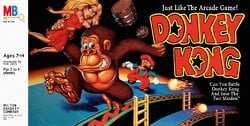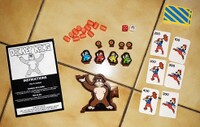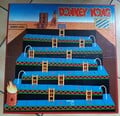Donkey Kong (Milton Bradley board game)
| Donkey Kong | |
|---|---|

| |
| Manufacturer | Milton Bradley Company |
| Publisher | Milton Bradley Company |
| Release dates | |
| Languages | English Dutch French German Italian Spanish |
| Age rating | Seven to fourteen years |
| Number of players | 2–4 players |
Donkey Kong is a board game released in 1982 by the Milton Bradley Company.[1] The game is based on the arcade game of the same name. It can be played by 2 to 4 players and is intended for ages 7 to 14. The goal of the game is to achieve the highest score by playing action cards that allow jumping over or hitting obstacles (barrels and fireballs).
On the American version of the game's box, the baseline reads: "Just Like The Arcade Game!" The subtitle reads: "Can You Battle Donkey Kong And Save The Fair Maiden?"
Gameplay[edit]
After establishing the turn order by rolling the white die, the first player rolls both white and red dice. Players also start with three faceup cards, and obtain new ones by landing their pawns on blue spaces with red dots. The player's Mario pawn is moved a number of spaces as indicated by the white die, either left or right, while the fireballs and barrels are moved a number of spaces as indicated by the red die (except if the "Kong Rests" face is tossed). Another barrel is also released on the gameboard by pressing Donkey Kong's arm. Fireballs and barrels travel up and down the gameboard, respectively, and can only use ladders if they land on the exact space under or above one (and if there are no Mario pawns on one for barrels specifically). Only fireballs can hit Mario pawns on ladders. Barrels can be destroyed by coming in contact with fireballs. Fireballs travel to the blue space in front of Donkey Kong, while barrels travel to the Oil Can space at the bottom and turn into a fireball. If an obstacle comes into contact with a player's Mario pawn, they must play a card by turning it facedown to receive the points indicated on the card. Each card can be a "Jump" or "Hit" card. If a player gets a Jump card, the obstacle is jumped and stays on the gameboard. If they get a Hit card, the obstacle is destroyed and removed from the gameboard. If a player runs out of faceup cards and is hit by an obstacle during their turn, they return one facedown card to the card deck, losing its points as well. If a player is hit during another player's turn and does not have faceup cards, that player steals one of the affected player's cards. If the player does not have neither faceup or facedown cards and is hit by an obstacle, they are not affected by it; if this happens during an opponent's turn, that player draws a card from the card deck. The game ends when one player reaches the finish space and rescues the Fair Maiden. The player who rescues her receives a 500-point bonus, and then all players' scores from their facedown cards are counted to determine the winner.
Game components[edit]
- 1 game board
- 1 red die (values 1 to 6)
- 1 white die (values 3 to 6, with two "Kong Rests" faces)
- 1 Donkey Kong (to be assembled)
- 4 "Mario" pawns in red, yellow, green, and blue
- 4 fireballs
- 1 sheet of stickers
- 2 rubber bands
- 48 cards:
- 8 "Jump" cards worth 100 points
- 8 "Jump" cards worth 200 points
- 8 "Jump" cards worth 300 points
- 8 "Hit" cards worth 200 points
- 8 "Hit" cards worth 300 points
- 8 "Hit" cards worth 400 points
- 12 barrels
Gallery[edit]
Names in other languages[edit]
| Language | Name | Meaning | Notes |
|---|---|---|---|
| Dutch | Donkey Kong[3] | - | |
| French | Donkey Kong[4] | - | |
| German | Donkey Kong[5] | - | |
| Italian | Donkey Kong[6] | - | |
| Spanish | Donkey Kong[7] | - |
Notes[edit]
- Milton Bradley produced a jigsaw puzzle that uses a flipped image of the board game's box art.
References[edit]
- ^ a b Donkey Kong Board Game Vintage 1982 Milton Bradley 4203 Nintendo
- ^ https://www.ebay.com/itm/276642521980 Brand New - Vintage Donkey Kong Board Game Complete Milton Bradley 1982 - Sealed]
- ^ Dutch box
- ^ French box
- ^ Donkey Kong Brettspiel Von MB - spiele 1983
- ^ GIOCO DA TAVOLA DONKEY KONG MB Vintage.
- ^ ANTIGUO JUEGO DE MESA DONKEY KONG MB JUEGOS ** CAJA EXCELENTE **









